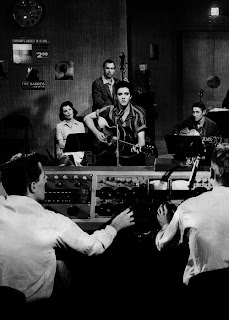The era of modern popular music begins with rock 'n 'roll in the early 1950s. Rock 'n' roll was a revolutionary hybrid of music genres like jazz, blues, country, swing and gospel. This music was primarily played and marketed to African Americans living in urban cities in a still-segregated USA. Like Jazz, rock 'n' roll was associated with sexuality and immortality and was disapproved by the establishment. The lyrics were explicit and the dancing got very dirty. Such acts were frowned upon in wasp societies and white teenagers tended to listen crooners their parents approved of: Bing Crosby, Dean Martin, Frank Sinatra and Pat Boone until came Elvis Presley.
With down and dirty rhythm and blues, clean-cut, extremely good-looking white boy Presley quickly gained popularity and was topping every music chart introducing white teenagers to the new era of rock 'n' roll. Presley also impacted television programs like the famous Ed Sullivan Show making it more provocative.
Although Elvis was loved by crowds of teenagers, an older generation did have their fears about the possibility of integration and social changes. Many feared Presley because he was a white boy who sang black music. But once Elvis performed on TV, it was clear that segregationists were fighting a lost cause against rock 'n' roll. Unlike Jazz, rock 'n' roll was loud and proud about black people's soul and rhythm influence.
In conclusion to this, Presley's acknowledgement and his open attitude towards non-white culture represented a revolution of some sort. It helped to open the minds of teenagers who enjoyed his hybrid music and who would later grow up into adulthood increasingly uncomfortable with the idea of segregation.
With down and dirty rhythm and blues, clean-cut, extremely good-looking white boy Presley quickly gained popularity and was topping every music chart introducing white teenagers to the new era of rock 'n' roll. Presley also impacted television programs like the famous Ed Sullivan Show making it more provocative.
Although Elvis was loved by crowds of teenagers, an older generation did have their fears about the possibility of integration and social changes. Many feared Presley because he was a white boy who sang black music. But once Elvis performed on TV, it was clear that segregationists were fighting a lost cause against rock 'n' roll. Unlike Jazz, rock 'n' roll was loud and proud about black people's soul and rhythm influence.
In conclusion to this, Presley's acknowledgement and his open attitude towards non-white culture represented a revolution of some sort. It helped to open the minds of teenagers who enjoyed his hybrid music and who would later grow up into adulthood increasingly uncomfortable with the idea of segregation.






